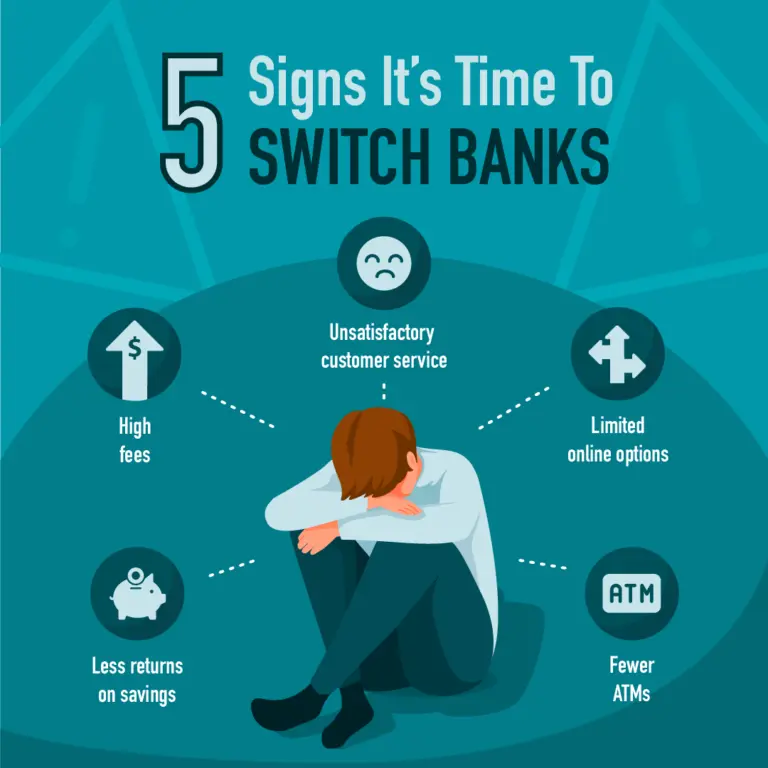When should you start looking for a new bank?
You deserve a bank that puts YOU – the Customer first! When you start seeing these 5 red flags, it’s time to switch banks.
Many of us often don’t give much thought to it, but banks are an integral part of our lives. Our paychecks are deposited into our bank accounts. We have loans with the bank. Even our credit and debit cards are all linked to our bank. They are undeniably a prime factor in our finances.
Not all banks are created equal even though they perform the same basic functions. And it is common that one type of bank may serve you better than another. Most people choose to stick with their existing bank due to many reasons. For some it is the familiarity while others are grandfathered into it.
Your relationship with your bank or any financial institution isn’t a “till death do us part” type of commitment. You can always get out of one and join another. There are several motivating factors behind a shift. In this article, we will attempt to address a few common issues that plague bank customers. Some of these are more severe than others.
Is it time to switch banks?
If you’ve been consistently dissatisfied with your banking experience, it might be the time to contemplate a change for the better. We have listed a few signs that you need to change banks. How many of these have you been facing? Let’s find out below:
1. Unsatisfactory customer service:
If your bank offers less than helpful customer service, you need to take a step back and consider a few things. Was it just one isolated bad experience or is it a repeat occurrence? Do the reps seem genuinely apologetic when there’s an issue or do they lack accountability? We’re all human, and it could be that you just caught them at a bad time. They could be having a bad day. But, if it happens frequently, the verdict is that their customer service is below average. As a paying customer you shouldn’t have to settle for that.
2. High fees:
Does your bank have several fees? Some banks try to make money at every step by imposing overdraft fees, monthly fees for a checking account, and a high minimum balance. We recommend doing some research on banking options with lower to no fees. If your bank is charging a number of fees, it’s time to change banks.
3. Less return on savings:
If you have a savings account, you want to see your money grow. But if your returns aren’t the best, researching into some high-yield options is highly encouraged. The average interest rate for a savings account in the nation is .06%. There are banks and financial institutions that give you a decent interest rate. The answer is to find a bank with a higher interest rate on savings and switch banks as soon as you can.

4. Limited online options:
This may surprise you, but there are banks across the country that to this day have very limited online banking options. They tend to stick to traditional banking and haven’t fully adapted to the convenience of the internet. They might have a website and some online presence, but making transfers is a major hassle for customers. If your bank is one of those, you need to switch to a bank that offers online banking and a mobile app.
5. Availability of ATMs:
Even though the world is going digital with all kinds of cashless payments, there are situations where you need cash. It could be at your church’s bake sale, neighborhood yard sale, or a kid’s lemonade stand. When you’re in a situation like that, you go to the nearest ATM. This is where it becomes helpful if your bank has accessible ATMs. If you have a tough time finding an ATM, it might be time to reconsider banking with your current financial institution.
Some banks, especially smaller ones, aren’t available cross-country. They may be stuck in one city, or in a select few areas. Many people actually switch banks when moving because of this exact issue. They want ATM options near their new home and new job. If their old bank isn’t in their new city, it might be time to switch.

Share this article on Facebook (coming soon)
These are a few components that several banks lack. We hope you’re able to relate with a few of these and take necessary action. We know that the mere thought of having to switch banks could trigger anxiety in some people. That’s why we suggest reading our takes on how to choose a new bank. We hope this aids you in finding the best bank suited to your needs.
Time to change banks
You might be wondering, “Is changing banks easy?” And we would love to inform you that it can be quite simple if you consult our piece on how to change banks.
People often ask, “Is it bad to change banks?”. The answer is No! You’re allowed to change banks if your current one isn’t serving you well. Banks and credit unions need to step up their game and make customers their focus. If your bank isn’t doing that, you need to take your business elsewhere. There are scores of financial institutions that offer better services. All it takes is a little bit of digging and then making the right choice.
It’s the modern era, and things should be more convenient than they were in the past. You need the convenience of online and mobile banking from your bank. We all live busy lives as professionals, students, parents, caregivers, and homemakers. As a result, we might not always have time to make in-person visits to our branch. That’s why it is necessary for a bank to have excellent service online and over the phone.
You deserve a better bank
We all like to be treated well by others. In our day-to-day lives, we expect people to be respectful and courteous. This is especially true if we’re a customer of a business. Bank tellers and customer support directly engage and interact with customers. It is important that they maintain a level of professionalism and politeness. A big part of their job is to be helpful and answer queries. If you feel like they’re falling short of those expectations, you need to switch banks and find one with better service. Read online reviews to find out what customers are saying about a bank before you choose to bank with them.
Your bank is a significant element of your finances and impacts your financial health. This makes it essential to bank with a financial institution that has it all figured out. After all, we want to be financially responsible individuals and take care of ourselves and our families.
To sum it all, we have just one big question: Is your bank really putting you and your needs first?

